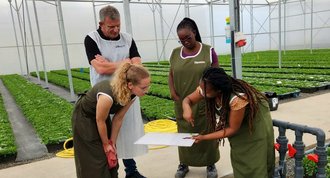
Every third rose sold in Germany now bears the Fairtrade seal. REWE and PENNY also use fairly traded roses in their flower ranges.
It should rain red roses for you - but only if the flower plantations in Africa or South America are really fair. The majority of flowers sold in Germany, including at REWE and PENNY, are grown in countries in the southern hemisphere - mostly by women. The working conditions are often not fair: low wages, lack of health and safety at work.
However, consumers are increasingly turning to roses with the Fairtrade seal: according to projections by the non-profit association Fairtrade Deutschland e.V., around 21 per cent more Fairtrade roses were sold in 2021 than in the previous year. Their sales reached a new record of almost 616 million stems sold. This means that every third rose sold in Germany bears the Fairtrade seal; the roses at REWE, for example, are all fairly traded. For the workers, this means a sufficient livelihood, better health protection and safer working conditions.
To further boost sales and awareness, the "Flower Power - say it with fair flowers" campaign is taking place between Valentine's Day and International Women's Day.
Fairtrade means fair trade. This is controlled trade in which producers receive a minimum price for their products, which is determined by a fair trade organisation.
Flower Power is the name of the current Fairtrade campaign for women's rights in the Global South. In 2020, around 300 million roses came to Germany from Kenya. Fairtrade strengthens the financial independence of female workers and their role as mothers with projects and training.
In addition to fixed employment contracts, the opportunity to join a trade union and maternity protection, strict environmental criteria are part of the Fairtrade standard. Employees also receive a Fairtrade premium.
Time for breastfeeding
One example among many: Anne Abuke from the Shalimar farm in Kenya has been committed to her colleagues for years. In the past, there was no maternity leave and those who gave birth and stayed at home were not paid and had to return to work as soon as possible. Thanks to Abuke's commitment, there is now paid, three-month parental leave; young mothers are given an extra lunch break to breastfeed their children.




